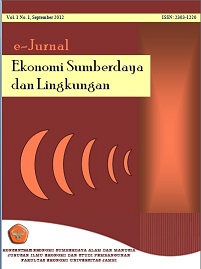Analisis keputusan wanita bekerja dan kontribusinya pada ekonomi rumah tangga di Kota Jambi
DOI:
https://doi.org/10.22437/jels.v7i2.11932Abstract
The purpose of this study is to analyze the socio-economic conditions of women, what factors influence the decisions of working women and how much the income contribution of women working towards the household economy. In determining the location of the study, this study used a "multistage sampling" method. Furthermore, proportional sampling will be applied, which is sampling in each region in proportion to the number of samples in each region. This study uses the "Binnary Logistic Regression" model, because the dependent variable is a dummy variable.
The results of this study indicate that the average length of education of respondents 12 years, the number of dependents 4 people, 52.41 percent of respondents with perceptions of gender equality and 3.5 million/month the average income of respondents' husbands. The regression results show the variable number of dependents and gender instincts has a significant effect on the decision of married women to work. While the education level and husband's income variables did not significantly influence the decision of married women to work. And the biggest contribution is respondents who work in the private formal sector.
Downloads
Downloads
Published
How to Cite
Issue
Section
License
Copyright (c) 2018 Yulia Desti Sukma, Heriberta Heriberta, Etik Umiyati

This work is licensed under a Creative Commons Attribution-ShareAlike 4.0 International License.


